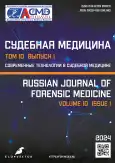Биочипирование в судебной медицине как технология определения согласия на причинение вреда: научный обзор
- Авторы: Тукенова Ж.С.1, Аликперов Х.Д.2, Бегалиев Е.Н.1, Сералиева А.М.3, Шаяхметова Ж.Б.4
-
Учреждения:
- Академия правоохранительных органов при Генеральной прокуратуре Республики Казахстан
- Центр правовых исследований, Баку
- Казахский национальный педагогический университет имени Абая
- Атырауский университет им. Х. Досмухамедова
- Выпуск: Том 10, № 1 (2024)
- Страницы: 47-55
- Раздел: Научные обзоры
- URL: https://bakhtiniada.ru/2411-8729/article/view/254426
- DOI: https://doi.org/10.17816/fm16092
- ID: 254426
Цитировать
Полный текст
Аннотация
В статье рассматриваются вопросы определения согласия на причинение вреда как основания исключения преступности через призму совокупности психических и физиологических процессов в организме жертвы с учётом разбора эмоционального отношения к психотравмирующей ситуации. Имеющаяся практика основана на показаниях и позиции потерпевшей стороны, а также отсутствии физических признаков сопротивления как показателя согласия на причинение вреда.
Изучаются вопросы взаимосвязи эмоциональных реакций организма на раздражитель через психические и химические его проявления для установления характера отношения жертвы насилия к конкретному действию.
Рассматриваются нормы уголовного законодательства Республики Казахстан и зарубежных государств по вопросам значения согласия потерпевшего на причинение вреда его правам и интересам, в частности при посягательстве на половую неприкосновенность. При изучении литературы по указанной тематике отмечена взаимосвязь между субъективным отношением жертвы насилия и химико-физиологическими процессами в организме.
Проанализированы также достижения учёных в определении химических и физиологических признаков стресса в режиме реального времени на примере биоанализаторов-биочипов. Авторы работы рассмотрели доказательственное значение данных технологий как способа определения согласия потерпевшего при отсутствии признаков стресса на момент воздействия. Кроме того, в работе осуществлён SWOT-анализ использования биочипирования для решения вопроса об определении согласия жертвы на причинение вреда, исключая возможность манипуляции и фальсификации доказательств.
Использование биочипов с анализаторами химических и физиологических изменений в организме человека в режиме реального времени позволит не только определить состояние стресса жертвы в момент посягательства как признак согласия или отказа на действие, но также расширит возможности как судебной медицины, так и в целом практической медицины в ранней диагностике заболеваний и оперативности лечения.
Ключевые слова
Полный текст
Открыть статью на сайте журналаОб авторах
Жанар Саулетовна Тукенова
Академия правоохранительных органов при Генеральной прокуратуре Республики Казахстан
Автор, ответственный за переписку.
Email: tukenovazhanar@mail.ru
ORCID iD: 0009-0001-8256-1121
SPIN-код: 8000-9337
Казахстан, Косшы
Ханлар Джафарович Аликперов
Центр правовых исследований, Баку
Email: xan_alikperov@hotmail.com
ORCID iD: 0009-0008-7855-8510
SPIN-код: 6706-4825
д-р юр. наук, профессор
Азербайджан, БакуЕрнар Нурланович Бегалиев
Академия правоохранительных органов при Генеральной прокуратуре Республики Казахстан
Email: ernar-begaliev@mail.ru
ORCID iD: 0000-0001-6659-8576
SPIN-код: 1929-3392
д-р юр. наук, профессор
Казахстан, КосшыАлия Мажитовна Сералиева
Казахский национальный педагогический университет имени Абая
Email: aliya-mazhitovna@mail.ru
ORCID iD: 0000-0002-3786-8757
SPIN-код: 1151-1080
канд. юр. наук, доцент
Казахстан, АлматыЖанна Бекполовна Шаяхметова
Атырауский университет им. Х. Досмухамедова
Email: jan68@inbox.ru
ORCID iD: 0000-0001-6965-9813
SPIN-код: 2619-4551
канд. юр. наук, доцент
Казахстан, АтырауСписок литературы
- Турсунов А.Б., Галицкий Ф.А., Бегалиев Е.Н., и др. Криминалистические и судебно-экспертные аспекты детского травматизма в результате бытовых травм и дорожно-транспортных происшествий: научный обзор // Судебная медицина. 2023. Т. 9, № 3. С. 299-308. EDN: ORUBFH doi: 10.17816/fm12389
- Clarke S., Foster J. A history of blood glucose meters and their role in self-monitoring of diabetes mellitus // Br J Biomed Sci. 2012. Vol. 69, N 2. P. 83-93. doi: 10.1080/09674845.2012.12002443
- Matthews D.R., Holman R.R., Bown E., et al. Pen-sized digital 30-second blood glucose meter // Lancet. 1987. Vol. 1, N 8536. P. 778-779. doi: 10.1016/s0140-6736(87)92802-9
- Аксенова Е.И., Камынина Н.Н., Маклакова Ю.А. Экспертный обзор: биосенсорные системы в медицине. Москва: ГБУ НИИОЗММ ДЗМ, 2020. 20 с.
- Trung T.Q., Lee N.E. Flexible and stretchable physical sensor integrated platforms for wearable human-activity monitoringand personal healthcare // Adv Mater. 2016. Vol. 28, N 22. P. 4338-4372. doi: 10.1002/adma.201504244
- Воеводкин Д.В., Рустемова Г.Р., Бегалиев Е.Н., и др. К вопросу выявления поддельных заключений судебно-медицинских экспертиз посредством применения технологии искусственного интеллекта по опыту Республики Казахстан: научный обзор // Судебная медицина. 2023. Т. 9, № 3. С. 287-298. EDN: EFNJIE doi: 10.17816/fm8270
- Yoon S., Sim J., Cho Y.H. A flexible and wearable human stress monitoring patch // Sci Rep. 2016. Vol. 6. P. 23468. doi: 10.1038/srep23468
- Han J., Yoon S., Lee W., et al. Ionic diffusion-driven ionovoltaic transducer for probing ion-molecular interactions at solid-liquid interface // Adv Sci (Weinh). 2022. Vol. 9, N 1. P. e2103038. doi: 10.1002/advs.202103038
- Kim K.H., Bang S.W., Kim S.R. Emotion recognition system using short-term monitoring of physiological signals // Med Biol Eng Comput. 2004. Vol. 42, N 3. P. 419-427. doi: 10.1007/BF02344719
- Аликперов Х.Д. Антикриминальный щит общества (дистанционный контроль над преступностью) // Меры противодействия совершению некоторых видов правонарушений посредством чипирования отдельных категорий лиц: Материалы международной научно-практической конференции, 25 сентября 2023 г. Алматы: Лантар-books, Республика Казахстан, 2023. С. 31-38.
- Оракбаев А.Б., Курмангали Ж.К., Бегалиев Е.Н., и др. К вопросу об использовании результатов виртуальной аутопсии (виртопсии) в ходе расследования преступлений: научный обзор // Судебная медицина. 2023. Т. 9, № 2. С. 183-192. EDN: OEERGD doi: 10.17816/fm774









